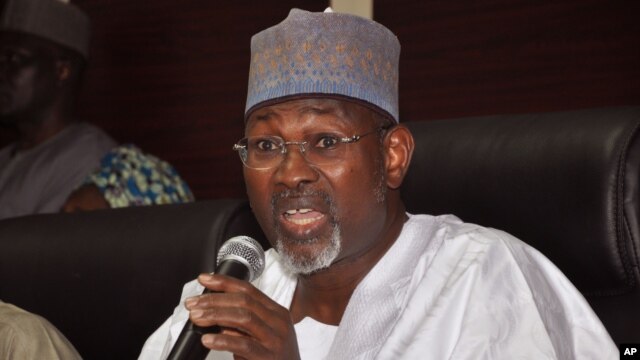
Independent National Electoral Commission Chairman Attahiru Jega speaks during a news conference in Abuja, Nigeria, Feb. 7, 2015.
A senior adviser to Nigeria’s incumbent President Goodluck Jonathan has denied reports the government pressured the Independent National Electoral Commission (INEC) to postpone the February election to March 28.
Doyin Okupe, senior special assistant to Jonathan on public affairs, said the administration urged the electoral body to ensure an estimated 10 million Nigerians are not excluded from the vote because they have yet to receive a biometric Permanent Voter Card (PVC) to enable them to participate in the poll.
The government also expressed concerns about the prevailing security situation in parts of the country’s north.
"The concerns of the president center around the issue of the security situation in the northeast where there are possibilities that innocent Nigerians will be disenfranchised for no other reason that they are resident in an area where insurgency is operational," Okupe said.
"Every Nigerian that have indicated interest in taking part in the election should be given the opportunity to make his own choice whether he wants to or not," he said.
Ensure credibility of election
Okupe said INEC needs to ensure the credibility of the election is not questioned.
"We have got to do things in such a way that we do not directly or indirectly affect the credibility of the electoral process. Because to do so is to allow for a situation where a winner emerges and the loser express the inadequacies and the imperfections in the system to create mayhem," he said.
However, opposition groups. including main opposition All Progressives Congress (APC), said the postponement of the poll is a setback for the country’s democracy.
APC supporters also said the ruling party postponed the election, fearing Jonathan will be defeated.
Okupe disagreed.
"In terms of preparedness, in terms of the chances of winning, President Goodluck Ebele Jonathan stands several miles apart from the presidential candidate of the APC, General Buhari," he said.
"The presidency asked INEC to check its own internal mechanism to see the earliest time apart from 14th of February that the election can actually be held in a proper atmosphere with no chance of actually disenfranchising any Nigerian who is ready to vote," Okupe said.
Citing security concerns, INEC chairman Attahiru Jega postponed the election, originally scheduled for February 14.
Jega told a news conference Saturday, "If the security of personnel, voters, election observers and election materials cannot be guaranteed, the lives of innocent young men and women and the prospect of free, fair and credible elections will be greatly jeopardized." |
|
